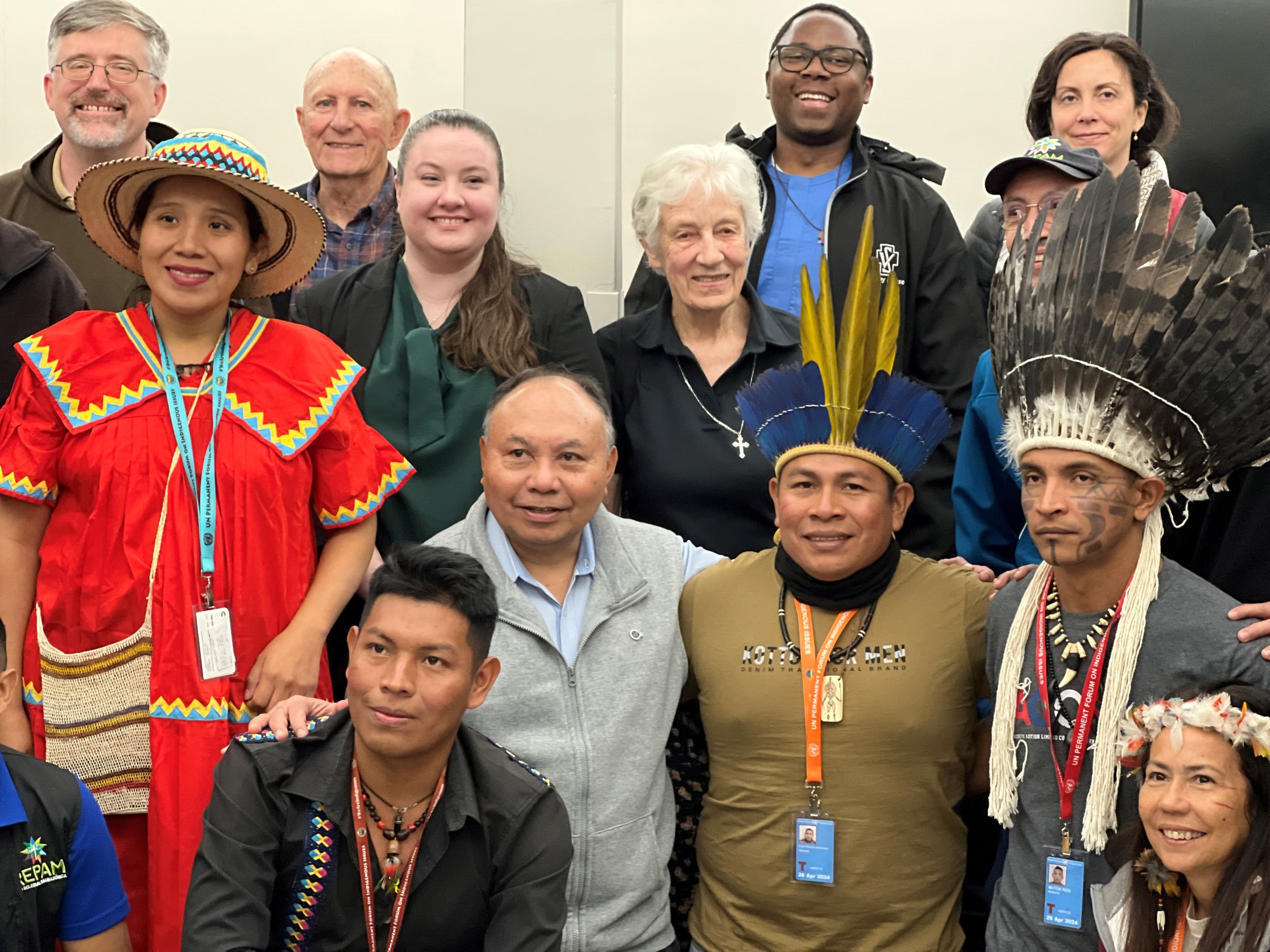FrankTalk: Healing Happens through Encounters
by Frank McCann, Congregation Peace through Justice Facilitator
Sacred symbols arranged for prayer ritual.
Franciscan Sister Laura Vicuña Pereira Manso’s diminutive size and beautiful smile disguise her formidable commitment and passion. Sister Laura is a descendent of the Indigenous Kariri people who no longer exist. She now lives one week each month with her religious sisters in Porto Velho, Rondônia, Brazil, and the rest of the month with the indigenous Karipuna people whom she accompanies.
Sister Laura sees that the Indigenous people’s way of life and their very lives are being threatened by changes in Brazil. The government, once a protector of the people, is influenced by corporations seeking trees, oil and minerals, and no longer safeguards the land of Indigenous people. Sister Laura’s personal, communal and religious desire to preserve the indigenous way of life may one day cost her her life. As a land defender, she is a target of assassins funded by corporations that try to still the voices of opposition. The land defenders are also not being protected by the Brazilian government.
Sister Laura is buoyed by the Spirit of Jesus whom she faithfully serves, although life as a woman in the Church is not without its own struggles. She prays that Pope Francis will recognize the women of the Amazon who do the daily work of deacons but are not recognized as such. She took her requests directly to Pope Francis in Rome and at Assisi. This energetic sister is not simply a radical voice; she is one of the four vice presidents of the Ecclesial Conference of the Amazon (CEAMA). This new, ecclesial institute has religious and lay representatives from nine nations and was formed by Pope Francis after the Amazon Synod.
A group of us were invited by Felipe Witchger to meet Sister Laura and hear her stories at a meeting in lower Manhattan. Felipe is the co-founder of the Francesco Collaborative, a community of investors who align their investments with the values and principles of Catholic Social Teaching. He has educated many of us about the economic system Pope Francis has in mind and has assisted with understanding impact investing. The Sisters of St. Joseph of Peace have a three-pronged approach to ecological economics: impact investing, charitable giving, and shareholder advocacy. When companies do not follow their commitments to human rights, to environmental targets, or racial equity goals, we dialogue and, if necessary, file resolutions pointing out the reputational risk to the corporation and the risk to our own investments.
Indigenous people from around the world, including Sr. Laura Vicuña Pereira Manso (far right), gathered at the UN during Indigenous Peoples’ week and were welcomed by members of the Religious at the UN.
At the time of our meeting, the Sisters of St. Joseph of Peace were deeply involved with Citibank over the damage to the land and water of Indigenous people in Canada and in the Amazon. Citibank claims that they respect the rights of Indigenous people and that they obtained Free, Prior and Informed Consent (a United Nations business standard) from these groups while also admitting that they never engaged Indigenous people in a dialogue.
Many of us wanted to hear a firsthand account of what losses Sister Laura had experienced. We never did discuss Citibank specifically, but I heard more than the words Sister Laura spoke at that meeting. Her eyes filled with tears as she talked of the land being taken because, she said, “We are the land, and the land is us.” She spoke of youth being killed trying to protect the land and of people who never knew hunger being hungry. She asked nothing for herself but requested that we help the Indigenous people who are being radically exploited by having their trees felled, land taken, and their waters polluted.
Felipe invited us to make donations to Sister Laura’s work and to think of other ways in which we could offer support to her and her people. There were several investors and fund managers in the room as well as two filmmakers. It will be interesting to learn how creatively we all respond, perhaps when we meet Sister Laura again at the United Nations Climate Change Conference that will be held in Brazil in 2025.
The next morning, I went to a parallel event, sponsored by religious at the United Nations during Indigenous Peoples’ Week, that brought voices together from the Global North and South. I should not have been surprised to find that Sister Laura was part of the predominantly male delegation from the Amazon. I was delighted when she stood up to begin our gathering with a movement inviting the Spirit to join us, followed by her singing several songs. There were Indigenous representatives there from Brazil, Ecuador, Panama, the Philippines, West Papua, as well as a Native American representative. Our closing prayer was for unity in our common work for justice.
I suppose that engagements like these are what Pope Francis, a great proponent of “encounter,” hoped would happen when he invited congregations to start the Laudato Si’ journey. Personal encounters with people experiencing injustice, much of it perpetrated by corporations from industrialized countries and unjust governments, is not something that can be found in a report. Reports do not convey emotions in the way that the tears welling up in Sister Laura’s eyes shared the truth about the extermination of the Indigenous people of the Amazon. It is through these encounters that hearts are changed, and true healing is made possible.
This article appeared in the Autumn 2024 issue of Living Peace.


